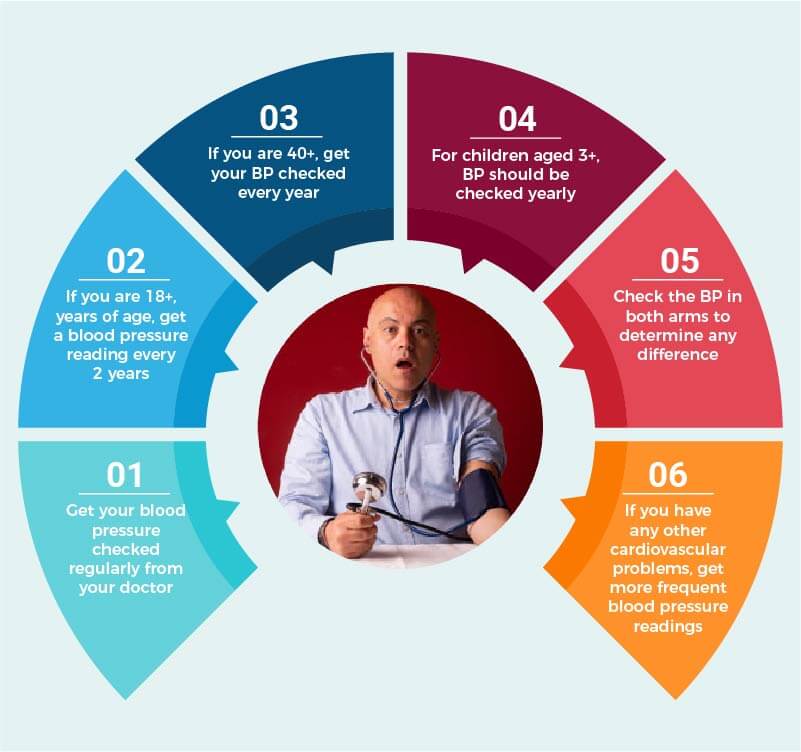Signs and Symptoms of High Blood Pressure/Hypertension

Are There Warning Signs and Symptoms of High Blood Pressure?
Hypertension is often referred to as the ‘silent killer’ meaning that almost one-third of the people who suffer from high blood pressure have absolutely no clue about it. Most of the time there are no hypertension symptoms and that is the biggest worry as the person suffering from it may already have damage to some major organs such as heart, brain, arteries, and kidneys without being aware of it.
Regular blood pressure testing is the only conclusive way to make sure that your blood pressure is in the normal range.
Actually, hypertension happens when least expected, but if you pay attention to your body, it might send out some early signs of high blood pressure. Patients who have uncomplicated high blood pressure may experience these particular changes:
- Headaches
- Blurring of vision
- Dizziness
- Shortness of breath
The symptoms of high blood pressure depend on the severity and duration of pressure so, patients who suffer from extremely high blood pressure the symptoms to watch out for would include:
- Severe headaches: During hypertension, the headache feels anything like migraine or your causal head pain. It is a lot more intense than normal and becomes extremely difficult to deal with.
- Chest pains: The chest pain during hypertension is caused due to decreased blood flow to the heart and leads to heart diseases.
- Difficulty while breathing: This is the first symptom of high blood pressure and usually occurs during everyday activities, such as climbing stairs.
- Irregular heartbeats: A key biological trigger makes the heart beat stronger in response to higher blood pressure. It feels like loud poundings in the chest.
- Fatigue: Fatigue can be the symptom of heart or kidney damage as a result of high blood pressure.
- Memory loss & confusion: Increasing damage to the brain blood vessels caused by untreated hypertension. This could also lead to memory loss.
- Nosebleeds: Hypertension causes the blood vessels in your nose to be more susceptible to damage and increase bleeding time .
Risks Of Uncontrolled Hypertension:

- Affect the arteries & heart which may lead to a heart attack
- Impair the function of kidneys leading to water retention, swelling in legs and in severe cases even kidney failure
- Affect the eyes causing vision damage
- Impede brain function which may result in dementia or a stroke
High blood pressure generally develops over a period of time, with causes of hypertension ranging from genetic history, obesity, lack of exercise, smoking, consumption of alcohol, high sodium & low potassium diet, stress and unhealthy lifestyle choices.
Fortunately for patients, high blood pressure can be detected early, treated, and monitored. To help control hypertension and avoid the consequences of high blood pressure, make sure you get your blood pressure checked regularly from your doctor. In addition, eat well, sleep well, exercise on a regular basis and lead a healthy life.
Consult Your Doctor To Find Out If You Have High Blood Pressure Or Hypertension
Note of caution: This article is for information purpose only. Always consult your doctor before altering any diet plans, medications or in case of any other blood pressure related troubles.
FAQs
1. How do you feel when you have high blood pressure?
Most people who have high blood pressure might not know they have it. In some cases, the symptoms aren’t clear, or the patient doesn’t feel anything. Some people feel the most common hypertension symptoms like chest pains, nosebleeds, shortness in breadth, immediate fatigue, or tiredness.
2. How do you know if your blood pressure is high or low?
The normal blood pressure reading is 120/80. If the reading is higher than the normal, say 130/90, it means the blood pressure is high, and if the reading is lower than normal, say 105/65, it indicates low blood pressure.
3. What does blood pressure indicate?
Blood pressure indicates the normal flow of blood in the body. Since the heart’s primary function is to pump blood, the pressure created when the blood leaves the heart is called systolic pressure. The pressure exerted when the heart rests between the beats is called diastolic pressure. Both the systolic and diastolic pressure indicates the reading of the heart.
4. What are the three symptoms of high blood pressure?
Some commonly observed symptoms of high blood pressure include:
1. Heaviness in the chest – A certain heaviness or even chest pains are observed.
2. Shortness in breadth – Feeling heavy breathing or difficulty is a definite sign.
3. Prolonged headaches – If your headache lasts longer than 2 days, then it should be checked.



Comments (13)
Gangadhara N
Very useful information. Thank you
Rudra
Thanks, this helps!
Kinjal
Never knew headaches could lead to hypertension.
Santoshi
I have high blood pressure. What should be an ideal diet for me?
BPincontrol Team
Hello, we are glad that you are concerned about your health. High blood pressure has some diet restrictions that you should follow to stay healthy. Here’s what you should and should not include in your diet - More of omega-3, Less salt, More citrus fruits, Include some pistachios, Carrots, celery, tomatoes, Greek yoghurt. These are just some simple and common diet suggestions you should follow. You should always visit a doctor to know more about your condition and get a proper diet chart.
Sana
Can children also have high blood pressure?
BPincontrol Team
High blood pressure or hypertension isn’t limited to older people. People at a young age also get diagnosed with hypertension. You should check the family history, the overall well being of the child. For this, we suggest you should consult your doctor as he/she can guide you with a personalised solution.
Aniket
What are the signs of hypertension?
BPincontrol Team
Hypertension generally doesn’t show any symptoms upfront, even if your blood pressure levels are alarmingly high. It’s best therefore to regularly monitor your blood pressure during routine check-ups. Some symptoms, however, do exist like: Headaches, Shortness of breath, Blurry vision, Pounding in the ears, neck or chest & more, Make sure you get the right solutions for these symptoms. We advise visiting the expert to know better about your issue.
Laxmi
My dad has hypertension; I am likely to have it?
BPincontrol Team
Hello, well, we do say that hypertension runs in the family, but we also say to be 100% sure. What also matters is do you have any of the following symptoms: Pounding in the ears, neck or chest, Nosebleeds, Irregular heartbeats, Fatigue, Chest pains, Severe Headaches If you do have these symptoms, then we advise getting your blood pressure levels checked. You should also visit an expert to know more about your blood pressure levels, as your results somewhat depend on your well-being.
Aayushi
Good to know about hypertension.
Abeer
Very insightful.
Add your comment